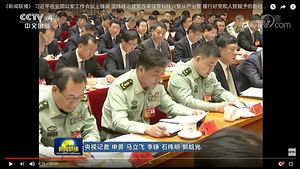China’s information warfare force, the People’s Liberation Army Strategic Support Force (PLASSF), has a new commander. Lieutenant General Li Fengbiao has replaced General Gao Jin as the new PLASSF Commander.
How Do We Know?
Chinese state media CCTV footage from the National Public Security Work Conference, held on May 7 and 8, shows Lieutenant General Li wearing the PLASSF insignia, indicating that he has been reassigned to the force.
Further, he has been promoted up one grade, from theater command deputy leader to theater command leader, the highest grade for a military officer that is not a member of the China’s supreme military body, the Central Military Commission (CMC).
Within the PLASSF, only its Commander and Political Commissar carry the Theater Command Leader grade.
Lieutenant General Li (born 1959) has spent most of his 40-year long military career in the PLA Air Force Airborne Corps. His past positions include deputy commander and chief of staff, Central Theater Command (2016-2019); deputy commander, Chengdu Military Region (2014-2016); commander, 15th Airborne Corps (2011-2014); and chief of staff, 15th Airborne Corps (2007-2011).
His predecessor, General Gao Jin, has been reassigned to head the CMC Logistics Support Department. Gao is a possible candidate for membership on the next CMC, which will be formed in late 2022.
What Is the PLASSF?
Established in late 2015, the PLASSF is China’s information warfare force, responsible for conducting space, cyberspace, electromagnetic warfare, and psychological operations. It is an important step on the PLA’s long journey toward integrated information operations, both for providing information support to military operations as well as for conducting information operations against adversaries, including counterspace and cyber operations.
The creation of the SSF highlights the importance attached to information superiority by China’s military planners. It also underscores the critical nature of space and cyberspace for China’s military power and national development.
Adam Ni is a China researcher at Macquarie University. His areas of interest include China’s foreign and security policy. Find him on Twitter @adam_ni.
































